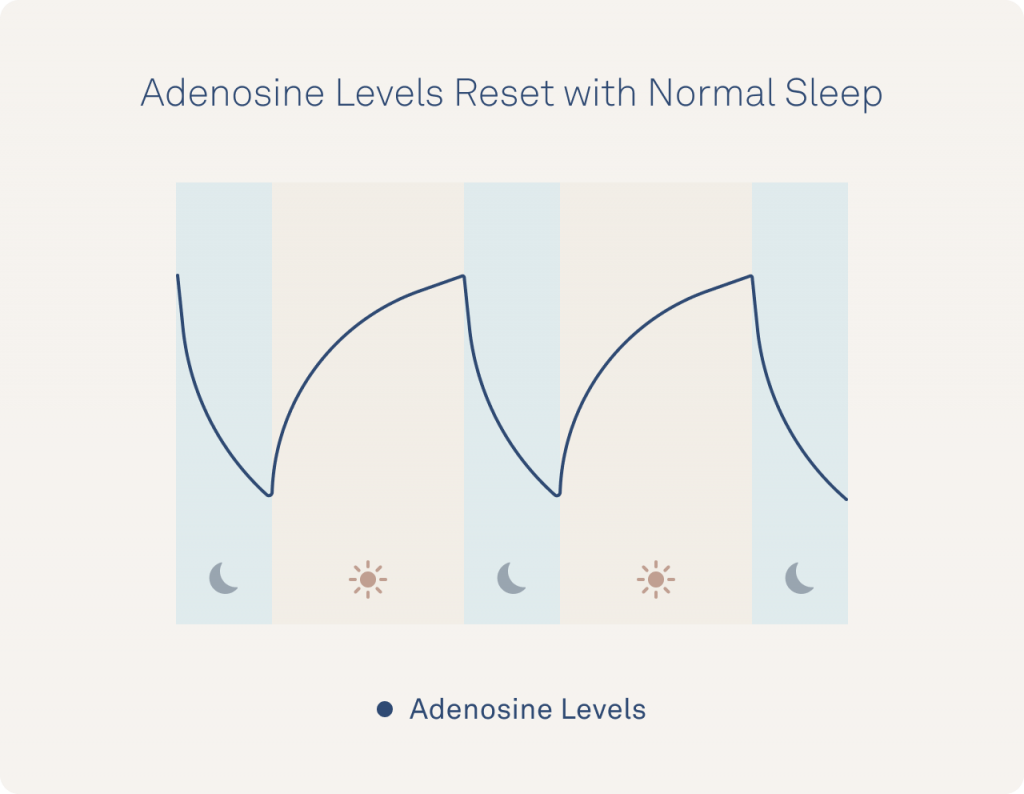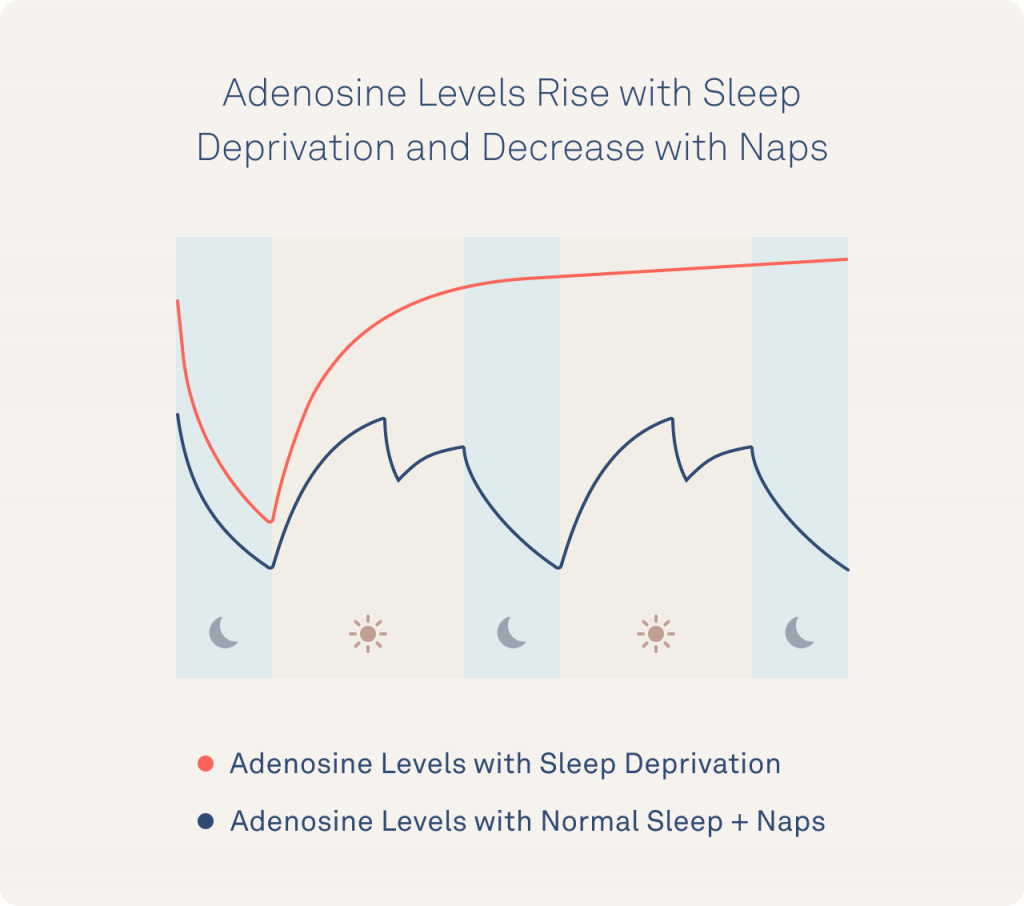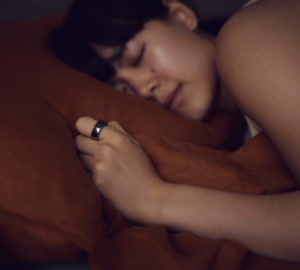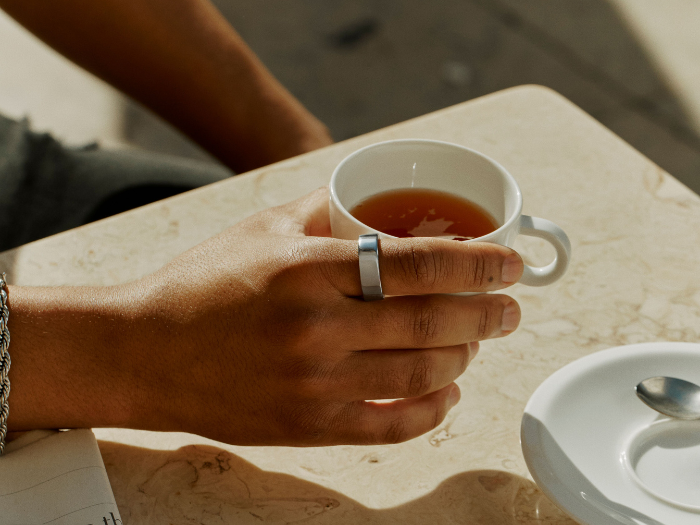For mange er en kopp kaffe om morgenen et kjært ritual. Og vi er ikke her for å si at du må slutte med det. Faktisk har moderat koffeininntak blitt knyttet til lavere risiko for flere sykdommer, inkludert type 2-diabetes, hjertesykdom og visse kreftformer.
Men hvis koffeininntaket ditt strekker seg fra en kopp (eller to) om morgenen til latte til lunsj og cappuccino om ettermiddagen, er det viktig å forstå hvordan koffein påvirker søvnkvaliteten din.
Les videre for å finne ut hvordan koffein påvirker søvndataene til Oura-medlemmer, hvilke faktorer som påvirker hvordan kroppen din fordøyer det, og hvordan du kan time kaffekoppen din for å unngå at det ødelegger søvnen din.
Slik påvirker koffein søvnen til Oura-medlemmer
I Oura-medlemsdata ser vi en ganske betydelig innvirkning når medlemmer bruker etiketten «koffein» sammenlignet med en dag hvor de ikke bruker etiketten «koffein». Basert på aggregerte og anonymiserte medlemsdata fra januar til juni 2025, opplevde disse medlemmene:
- 49 minutter mindre søvn totalt
- 6,4 minutter mindre REM-søvn
- 23 minutter mindre lett søvn
- 9,2 minutter mindre dyp søvn
- 8,2 poeng lavere søvnpoeng
RELATERT: Hvordan påvirker alkohol Oura-medlemmer?
Slik påvirker koffein søvnsyklusen din
 Kroppens delikate søvn-våken-syklus, som primært styres av den 24-timers døgnrytmen og et komplementært søvntrykksystem, er svært utsatt for forstyrrelser fra koffein.
Kroppens delikate søvn-våken-syklus, som primært styres av den 24-timers døgnrytmen og et komplementært søvntrykksystem, er svært utsatt for forstyrrelser fra koffein.
Koffein gjør deg mer våken ved å lure hjernen din, fordi det krysser blod-hjerne-barrieren og blokkerer adenosin, en viktig nevrotransmitter i hjernen som signaliserer tretthet.
Jo lenger du er våken, desto mer adenosin samler seg vanligvis opp i hjernen din, og det bygger opp søvntrykket. Det binder seg til reseptorer og sender «Sov nå!»-signaler gjennom hele kroppen. Når du endelig får sove, blir denne tavlen visket ut, og adenosinnivået ditt nullstilles.
Men når koffein kommer inn i hjernen, «passer» det rett inn i de samme reseptorene og hindrer adenosin i å feste seg. Dette får hjernen din til feilaktig å registrere at den har vært våken i kortere tid, noe som gjør at du føler deg mer våken og mindre søvnig.


Når koffeinet endelig forlater kroppen din, kan du oppleve et «koffein-krasj». Dette skyldes at alt adenosinet som ble blokkert har samlet seg opp, og når koffeinet forsvinner, binder det seg til alle disse reseptorene samtidig, noe som fører til en intens bølge av søvn.
Alvorlighetsgraden av denne opplevelsen – og hvor raskt det skjer – varierer betydelig fra person til person, siden koffein fjernes fra kroppen i forskjellig tempo.
RELATERT: Bør du vente med morgenkaffen?
Halveringstid for koffein: Hvor lenge holder koffein seg i kroppen din?
 Halveringstiden til koffein handler om hvor lang tid det tar for kroppen din å bryte ned halvparten av koffeinet i systemet ditt – og å forstå dette er viktig for å sikre god hvile under søvn om natten.
Halveringstiden til koffein handler om hvor lang tid det tar for kroppen din å bryte ned halvparten av koffeinet i systemet ditt – og å forstå dette er viktig for å sikre god hvile under søvn om natten.
Koffein har en typisk halveringstid på 3 til 7 timer. Det kan imidlertid forekomme individuelle variasjoner, og halveringstiden kan variere fra 1,5 til 9,5 timer, med et gjennomsnitt på omtrent 5 timer.
Så hvis du nyter en kopp kaffe klokka 15, har du bare brutt ned halvparten av koffeinet innen klokka 20 – resten sirkulerer fortsatt aktivt i kroppen din og påvirker både hvor raskt du sovner og søvnarkitekturen (altså evnen din til å bevege deg gjennom alle søvnstadier).
Hvis du forbrenner koffein sakte, kan denne effekten vare enda lenger.
Koffeinmetabolisme: Er du en rask eller langsom forbrenner?
Har du noen gang lurt på hvorfor vennen din kan ta en espresso etter middag og sove som et spedbarn, mens du ligger og stirrer i taket etter en latte til lunsj? Din evne til å håndtere koffein handler ikke bare om hvor mye du drikker – den er forankret i din biologi.
Fra genetikk til hormoner og livsstil er det flere faktorer som avgjør hvor lenge koffein blir i kroppen og hvordan det påvirker søvnen:
Genetiske faktorer
Genene dine spiller en viktig rolle i hvordan kroppen din bryter ned koffein. Det viktigste genet som er involvert, er CYP1A2. Det påvirker aktiviteten til et enzym i leveren som hjelper til med å bryte ned koffein. Personer med en variant av dette genet produserer mindre av enzymet, noe som betyr at de bryter ned koffein saktere. Disse personene kalles ofte langsomme forbrennere.
Omtrent halvparten av befolkningen har denne varianten med langsommere metabolisme, som kan forlenge koffeinens halveringstid betydelig, noen ganger opp mot 10 timer eller mer.
På den andre siden bryter raske forbrennere ned koffein raskere, fjerner det raskere fra kroppen og tåler ofte kaffe senere på dagen med færre søvnrelaterte bivirkninger.
Når du forstår din genetiske koffeinfølsomhet, hjelper det ikke bare søvnen – det henger også sammen med den generelle helsen din. Forskning tyder på at personer med langsom metabolisme kan ha økt risiko for hjerte- og karsykdommer når de drikker store mengder koffein, spesielt fra kaffe.
Hormoner, prevensjon og koffeins påvirkning på søvn
Hormoner kan betydelig påvirke hvordan kroppen din håndterer koffein.
Menstruasjonssyklus
For kvinner ser det ut til at østrogen bremser koffeinmetabolismen ved å hemme CYP1A2-enzymet. Dette betyr at i visse faser av menstruasjonssyklusen – spesielt i lutealfasen når østrogen- og progesteronnivåene er høyere – kan koffein bli værende i kroppen lenger og ha en mer uttalt effekt på søvn.
| Medlemstips: Forstå syklusen din gjennom alle fasene med Ouras syklusinnsikt. |
Prevensjon
Denne effekten er enda tydeligere hos de som tar p-piller. Studier viser at halveringstiden for koffein kan dobles hos kvinner som bruker hormonell prevensjon – noen ganger øker den fra de typiske 5–7 timene til over 10 timer. Som et resultat kan selv en beskjeden dose koffein på ettermiddagen forstyrre søvn.
Graviditet
Graviditet er en annen viktig hormonell tilstand som påvirker hvordan kroppen bryter ned koffein. Under graviditet, spesielt i tredje trimester, brytes koffein ned mye saktere enn vanlig. Halveringstiden kan strekke seg til 11–18 timer, noe som øker både den stimulerende effekten og den potensielle innvirkningen på fosterutviklingen – derfor anbefales det å innta maksimalt 200 mg per dag under graviditet
LES MER: Ni kaffealternativer du kan prøve under graviditet
Andre faktorer
I tillegg til genetikk og hormoner kan flere andre faktorer påvirke hvor raskt kroppen din forbrenner koffein:
| Faktor | Hvordan det påvirker metabolismen |
| Alder | Forbrenningen av koffein har en tendens til å avta med alderen, spesielt hos eldre voksne. |
| Leverfunksjon | Leversykdom eller nedsatt leverfunksjon reduserer nedbrytningen av koffein. |
| Røyking | Øker CYP1A2-enzymaktiviteten, og øker hastigheten på koffeinutskillelsen med opptil 50 %. |
| Kosthold | Korsblomstrede grønnsaker (f.eks. brokkoli, grønnkål) kan øke CYP1A2-aktiviteten. |
| Medisiner | Visse legemidler (f.eks. fluvoxamin, cimetidin) hemmer forbrenningen av koffein, mens andre øker hastigheten. |
| Alkoholinntak | Alkohol hemmer nedbrytningen av koffein ved å redusere aktiviteten til CYP1A2. Studier viser at et alkoholforbruk på 50 g per dag forlenger koffeinens halveringstid med 72 % og reduserer fjerningen av koffein med 36 %. |
| Kronisk stress | Stress kan forstyrre kroppens stressresponssystem, særlig HPA-aksen, og føre til økt kortisolproduksjon. Dette kan igjen påvirke hvordan kroppen håndterer koffein, og potensielt forlenge virkningen eller gjøre den mer intens. |
Når bør du slutte med koffein for å få bedre søvn?

Det finnes ikke noe fasitsvar på når man bør slutte å drikke koffein, men tidspunktet er viktigere enn du tror. Siden koffeinets halveringstid varierer fra 5 til 7 timer (og enda lenger for personer med langsom metabolisme), kan den latten du drakk sent på ettermiddagen fortsatt være i kroppen din ved leggetid, og forstyrre både evnen din til å sovne og søvnkvaliteten.
Søvnforskere og klinikere anbefaler generelt å kutte ut koffein minst 8–10 timer før leggetid. For de fleste betyr det ingen koffein etter klokka 14 – og helst enda tidligere hvis du er ekstra følsom eller ofte har problemer med å sovne.
Selv små doser koffein (som et stykke mørk sjokolade eller en kopp grønn te) kan forstyrre kroppens evne til å produsere og reagere på adenosin, molekylet som bygger opp søvntrykk gjennom dagen.
LES MER: Åtte matvarer og drikker for bedre søvn (og fire du bør unngå!)
Slik kan du bruke Oura til å spore hvordan koffein påvirker deg: Måledata for bedre hvile
 Med Oura Ring kan du se hvordan selv en liten dose koffein påvirker søvn og innhenting ved å følge med på viktige måledata.
Med Oura Ring kan du se hvordan selv en liten dose koffein påvirker søvn og innhenting ved å følge med på viktige måledata.
Begynn med å bruke etiketter i Oura-appen for å loggføre når du inntar koffein. Etter hvert vil du legge merke til mønstre i hvordan kroppen din reagerer, spesielt hvis du får i deg koffein senere på dagen.
Her er noen måledata for søvn og innhenting du bør følge med på:
- Hvilepuls (RHR): Koffein stimulerer nervesystemet ditt og kan øke RHR, noe som gjør det vanskeligere for kroppen din å roe ned. Du kan merke en høyere gjennomsnittlig hvilepuls gjennom natten, eller at det tar lengre tid før du når det laveste punktet ditt.
- Søvnlatens: Hvis det tar deg lengre tid enn vanlig å sovne, kan koffein være grunnen – særlig hvis du har drukket det på ettermiddagen eller kvelden.
- Våkentid og søvneffektivitet: Koffein kan føre til at du våkner oftere om natten, noe som reduserer søvneffektiviteten din og gjør at du føler deg sløv dagen etter.
- HRV (hjertefrekvensvariabilitet): Et sentralstimulerende middel som koffein kan redusere HRV, en markør for innhenting og aktivitet i det parasympatiske nervesystemet.
RELATERT: Hvorfor våkner jeg trøtt? Slik føler du deg mer våken om morgenen











